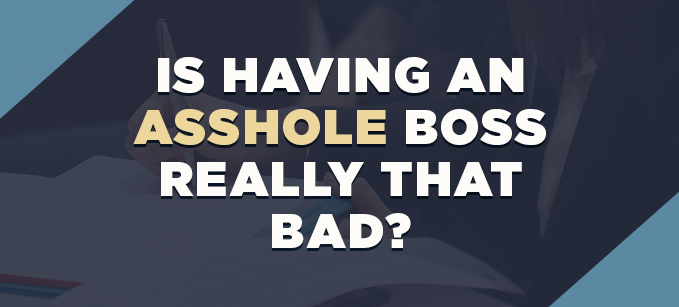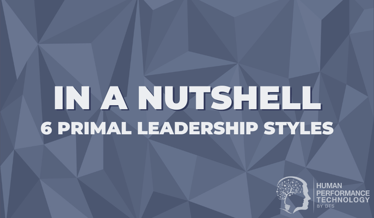Is Having an Asshole Boss Really that Bad

The question "Is having an asshole for a boss really that bad?" was posed by this article written by a US colleague. The answer, just in case you were in any doubt, is yes, it really is bad. Glad that's out of the way.
So just what was the point of the article you're wondering?
Actually, it wasn't at all in defence of the really nasty, horrible, "I don't pay you to think, I pay you to do as your told," kind of boss, but it did make a very interesting point about those mis-understood folks in management who have an extremely “Dominant” (D) style on the DISC Assessment.
Managers with this behavioural style can often rub people the wrong way, since they tend to be:
- Very direct and assertive
- Quick to act
- Don't mind confrontation
- Don’t accept mediocrity (they want results)
- Provide candid feedback (they will cut straight through the BS)
People with these sorts of "D" characteristics are often thought of as taking the term "boss" a little too literally, and the question we get from many leadership consultants and HR professionals becomes something like this:“Is their high D the reason the person is a [descriptive adjective]?”
The answer is absolutely not. If someone is generally thought to be a [descriptive adjective], that would depend on something else, namely their level of emotional intelligence.
To be clear, there is a fine line between being assertive (a common hallmark of the D Style) and being rude(a common hallmark of low EQ). The D may say something candid, that they see as 'telling it like it is,' but someone else may view the same comment as brutal, and utterly lacking in empathy. In any case, emotional intelligence determines whether you experience the D style as a quick cuddle, or as a tactless sledgehammer.
It's not uncommon for people to use their DISC style to justify rude, piggish, or abusive behaviour. E.g. "I'm blunt because of my D, so deal with it." Anyone who would use their D style as a rationalisation for offending others, is only that person trying to rationalise their lack of emotional intelligence. What they're really saying is: "I'm blunt because I have low EQ and have never learnt how to handle my emotions and communicate properly, so that's why I act like a child."
As a leader, it is possible to get things done quickly, give candid feedback, hold people accountable, and still be a decent human being at the same time - but it requires Emotional Intelligence (or in the old school vernacular: maturity).
This point is best summarised in Patch's statement to Mitch in the movie Patch Adams.
Context: Mitch (Philip Seymour Hoffman) and Patch (Robin Williams) are roommates studying medicine, when Mitch is led to believe that Patch (who gets top grades) is cheating, because he always seems to be making jokes and not taking his work too seriously (Patch isn’t actually cheating, he’s just more intelligent).
Patch: “You know, I forget how young you are Mitch... that you think you have to be a prick to get things done... and that you actually think that that's a new idea.”

Theo Winter
Client Services Manager, Writer & Researcher. Theo is one of the youngest professionals in the world to earn an accreditation in TTI Success Insight's suite of psychometric assessments. For more than a decade, he worked with hundreds of HR, L&D and OD professionals and consultants to improve engagement, performance and emotional intelligence of leaders and their teams. He authored the book "40 Must-Know Business Models for People Leaders."


/Using%20DISC%20to%20Build%20High-Performing%20Hybrid%20Teams.png?width=374&name=Using%20DISC%20to%20Build%20High-Performing%20Hybrid%20Teams.png)
We Would Like to Hear From You (0 Comments)